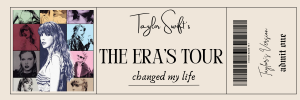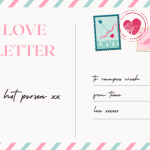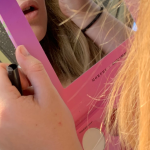by Jackson Machado-Nunes
There is no bigger green flag than caring about the environment, but Lucy Bell’s You Can Change the World misses the big picture, and loses out on being a text that successfully contributes to change on a big scale.
You Can Change the World, is the 2019 children’s, non-fiction fact and info book from author Lucy Bell. On the heftier side for a children’s book at 215 pages, Bell shares shocking facts about our effect on the world, manageable, and sustainable lifestyle tips, testimonials from young environment-warriors, and colourful illustrations of wildlife (there’s a drawing of a cow on page 95 in particular that lives in my head rent free).
The book made the shortlist for the 2020 Australian Book Industry Awards, the 68th Australian Book Design Awards, and the Environment Award for Children’s Literature. From the outside looking in, and as a huge environmentalist myself, what even is there to critique about a book that attempts to do so much good? I love what Bell does here by trying to educate kids about how to care for the environment with manageable changes in their daily life, and without that shock factor that so often accompanies environmental literature.
But the more I read, the more I began to wonder, is this book really doing anything at all? To even think that might make me more cynical than most, but I think you have to be. Bell writes into a space here that’s difficult to critique. I mean – even a book that does half a good job for the environment is better than nothing, right?
The first thing I noticed about the book that didn’t quite sit right with me was that it seems to make a concerted effort to avoid talking about deforestation (unless of course, it’s at the hands of farming for palm-oil). Ok, the math checks out, it makes sense that an author would feel a bit self-conscious about that considering we write books in the hope of seeing them in print – but at the same time, who are we to call out every other industry without turning the mirror on ourselves?
There is a small section at the beginning of the book underneath the copyrights page that says how Pantera Press uses only natural and recyclable papers from sustainable forests, but it’s very much in the fine print, and considering how many pages are filled with 90% just a block-colour or drawings of kettles – there was room for a full spread about their sustainable printing habits. Even if they’re not the absolute best printing habits yet, they could talk about their plan at least. It felt like a lack of transparency to me, and it seems like Pantera Press low-key has a vendetta against ebooks, so to me it just feels kinda shady. Touting a sustainably made, carbon-neutral environment book a-la Lorde’s Solar Power promotions would have gotten this book all three of those awards mentioned earlier. With all the new and innovative ways of storytelling that we have now, I can’t help but feel like they chose the easy way out.
Back to page count – this book was a little long. This book seemed to hold the prestige of being an environmental book with all the facts and info in it – higher than being an enjoyable children’s book. This is a lot of information for children and honestly even adults to take in all at once. It’s a lot of interviews with children that are – yes, iconic little entrepreneurs with great sustainable causes, but the interviews aren’t always fun to read and range from being literal one line answers from eight-year-olds to huge paragraphs that I wouldn’t have been able to string together at that age. They felt more for the adults that might read this to their child in the evening.
We’ve got Felix and Freida who started an ethically sourced cotton t-shirt company at eight years old, and Jean Hinchcliffe who founded the Sydney School Strike 4 Climate protests at thirteen. Again, fantastic causes, but technology could have been a bit more innovative here – try a fun research activity to save pages not just for readability, but sustainability as well.
In this way, You Can Change the World doesn’t commit to an audience. Maybe Bell was targeting children because they’re more impressionable and will teach their families about the environment, pushing the information up through the generations.
However, I don’t see this book attracting the attention of families that aren’t already environmentally minded. This is either a gift from an environmental parent to their child as their little bible, or a gift from an environmental uncle or aunt, or maybe even a baby-shower gift from that one diva that wants to make the other mums feel bad for all the wrapping paper they used (which this book wouldn’t do because it doesn’t talk about deforestation).
I also take issue with Bell advising to avoid clothes “Made in China” or “Made in Bangladesh”, and notably to seek clothes “Made in Australia”. This was one of the clearer examples of a moment that showcased a lack of research grounding the book. Firstly, “Made in Australia” does not necessarily mean that the products used were sourced in Australia, and definitely not that the product wasn’t created by workers earning under minimum wage (@Bonds, @JustJeans). This idea that China and Bangladesh are run solely on the backs of sweatshops and Australia just straight up has none – I shouldn’t have to explain that this is an outdated and xenophobic sentiment.
Now, this book does spill some tea:
‘Every day, the average Australian family creates nearly 2.5 kilos of waste. Over one year, that’s enough to fill a three-bedroom house!’
‘Every single known species of turtle has been found with plastic in or around its body.’
‘There are more plastic flamingos in the world than real ones.’
Those more serious parts of this book were my favourite, because it felt real. The whimsical take on this subject is especially fantastic for kids, but the truth is, the title is a lie. Children can change the world sure, but they can’t save it. Acting like this is a children’s issue simply because they will inherit the Earth is a fallacy. The truth is that we have to save the world right now – for them.
Bell gives us fantastic tips on how to do that, like plastic free birthday tips, recipes (they were a slayful idea), house-plant ideas and gardening tips, how to re-use trash, composting tips, pesticide free ways to keeps bugs away – the foundations are amazing! But being a book doesn’t do it all enough justice. This whole experience could have worked better and gained greater attention as a subscription box-like service, like the ones people get for Japanese lollies or book recommendations.
A monthly or so subscription dedicated to a sustainable idea (like sewing or composting), and each could come with a feature on the wonderful examples of young environment warriors, and a colouring in of an endangered animal (I mean take your pick). It could even be a situation where families pick their theme online whenever they want a delivery and all the boxes are prepared once ordered so there isn’t waste or missing out.
So yes, this book has great information, and Bell did kinda girlboss snap here, but not like those shortlists thought she did. It’s not just the kids that need to be doing more, it’s us – the current creatives of this industry that need to innovate here and now.
Jackson Machado-Nunes is a Meanjin based, non-binary writer in their final semester of undergraduate study. Follow their Instagram @deku.of.dune for outfit updates, and poetry off-cuts.
If you are interested in reviewing for Glass, register your interest here.








